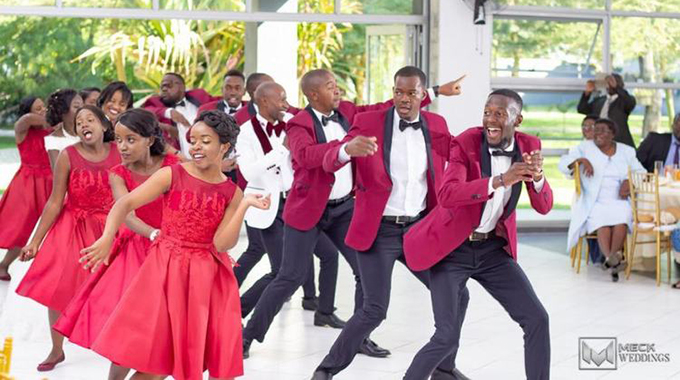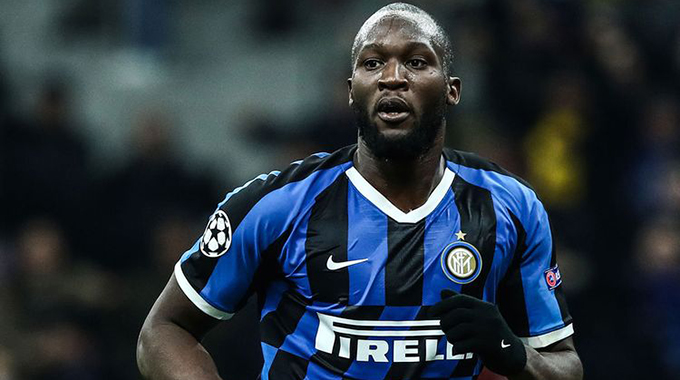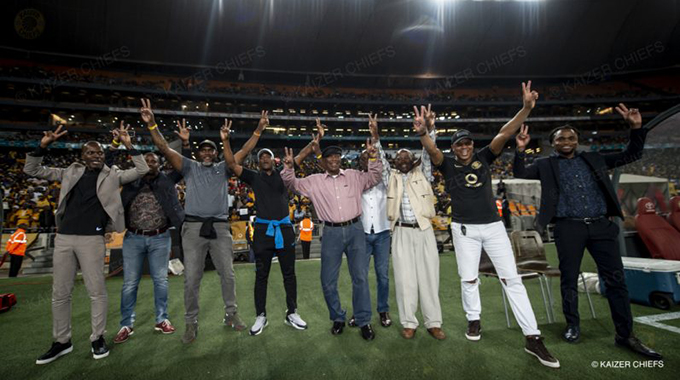The death of wedding choreography

Kundai Marunya
A memorable wedding is to many, a sum of traditions, plumage, class elegance, good food, fancy footwork, and above all entertainment.
It’s about leaving memory imprints of the ambiance of glamour, glee and grandeur.
This is probably why the words “kick, lock, chachacha” sound very familiar not only to those who were fortunate enough to be part of bridal teams, but also those who grew up before the turn of the millennium.

Wedding choreography was a very big part of the ceremony; being the main source of entertainment, supported by dance challenges from witty relatives.
To be drafted in the bridal team were mostly friends and relatives who have built reputation with their great dance capabilities.
Bridal teams spent hours on end, months even, rehearsing different dance moves first to introduce those tying the knot to friends and relatives, then to keep the ceremony alive and colourful for the enjoyment of those in attendance.
They would rehearse their legs off, making sure the few stiff-bodied who were part of the bridal teams were good enough for the ceremony.
A lot of time and money was invested in making sure everything was on point.
Even the rehearsals would attract onlookers, that’s how big wedding choreography was.
During wedding ceremonies, the wealthy in the family would often pledge large sums of money to get either the bridal team or the couple to repeat a dance.

Bets and counter bets placed until one would concede to dance were a source of fundraising for the newly married.
In recent times, professional choreographers are being engaged to spice up the dance routines which are then revolutionised to incorporate trending moves.
John Cole, for example, has been hired to choreograph over 500 weddings including those of celebrity made large sums of money adding flair to wedding ceremonies.
He attested to charging an equivalent of close to US$30 per hour to choreograph weddings.
“I am paid per session which are usually two hours long. People are different as some require longer hours to catch on the dances but we usually do 10 sessions per wedding,” he said.
But now it’s a different game altogether.
People are now hiring music bands and dance groups for entertainment.
Wedding planner Tapiwa Muwani said wedding choreography has become increasingly expensive.
“People meet regularly to practice dances which takes in a lot of money covering transport, food and fees paid out to choreographers,” she said.
“It’s now much cheaper to hire a dance group and have the bridal team enjoy the wedding.”
Muwani said people are also valuing time more than in the past.
“You will find that most people have become entrepreneurs which means they spend most of their time, weekends included, working to build their businesses.
“The more one works the bigger the return thus many people prefer to hire wedding planners to take care of everything.

“They just do not have the time to spare for long hours of practice,” she said.
Muwani said she hires musicians and dance groups instead depending on the entertainment budget agreed on with the client.
“Some clients splash a lot on entertainment.
They require us to hire top musicians such as Jah Prayzah, Sulumani Chimbetu and Alick Macheso depending on their taste in music.
“Even the late Oliver Mtukudzi was popular at many weddings.
“We also hire upcoming musicians who sing renditions depending on the entertainment budget provided,” she said.
“It is also the same trend with dance groups, there are some who are quite pricey while some are relatively cheap.”
One of the most sought after musician when it comes to weddings and family gathering is Mbeu who either plays solo on his acoustic guitar or with his band The Mhodzi Tribe.
He is a favourite for many because of how he has mastered stage work, which comes with a well-choreographed set that once engaged, it will not be necessary to hire a dance group.
Mbeu’s manager Eugene Museredza said they are hired by locals and diasporans.
“Last year we played at about 20 weddings for people based in Zimbabwe and outside the country.
“We were booked by Zimbabweans living in China, South Africa and United Kingdom among other countries,” he said.
Museredza said they have come up with different packages for their clients.
“We usually play with our full band which our clients request the most.
We also perform a solo set depending on the client’s preference and budget.
“This year our package includes video recording and photography on top of the usual P.A system and DJs we provide,” he said.
One time wedding choreography Tinashe Makwena, realising the changing trend joined hands with fellow dancer Witness Chawira to form a six-member dance group.
“I have worked as a wedding choreographer from 2010 to 2016 when we then formed a dance group ‘Born to Dance’ which offers services at weddings, graduation parties and road shows among other events,” said Makwena.
‘Born to Dance’ normally get hired up to five times a month to dance at weddings.

Born to dance crew
“Weddings are fewer at the beginning of the year so up to April we usually perform at three weddings a month but from April onwards we get hired for sometimes five weddings a month,” said Makwena.
Many may be ditching the traditional wedding choreography but it has not completely died down.
There are many who choose to stick to tradition while others incorporate new entertainment trends.
Whichever way one chooses, entertainment remains a big part of what makes a wedding great.








Comments